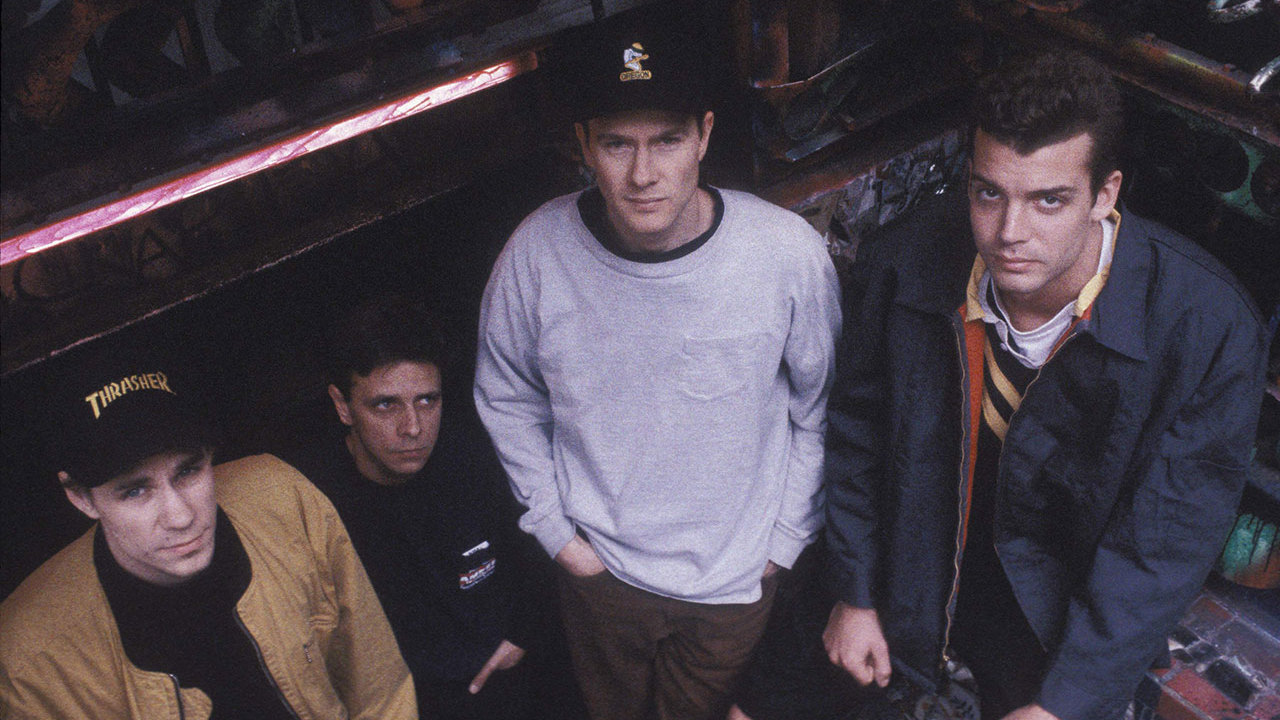Helmet were formed in New York City in 1989 by former Band of Susans member and jazz guitarist prodigy Page Hamilton.
He recruited bassist Henry Bogdan, guitarist Peter Mengede and drummer John Stanier and quickly earned a reputation for their punishing, riff-driven live shows. The quartet signed to Amphetamine Reptile Records, with whom they released the abrasive single Born Annoying and their full-length debut Strap It On.
It was with their 1992 major label debut Meantime that the band truly made their mark on the alt-rock landscape. To date, the album has sold over 2 million copies.
The band have endured numerous line-up changes since the release of 1997's Aftertaste – after which they disbanded for several years – and only Hamilton remains from the original line-up.
This autumn, Helmet will play across North America with Clutch, Quicksand and JD Pinkus. To kill time before this formidable tour kicks off, we've ranked their studio albums from worst to best.

8. Monochrome (2006)
From the opening savage bursts of Swallowing Everything, it’s clear that Hamilton was attempting to recapture the sound of their earlier output.
Wharton Tiers, who worked on their 1990 debut Strap It On and its 1992 follow-up Meantime, was drafted in to co-produce the album and even used the same tape machine for another layer of authenticity.
Working as a trio – bassist Chris Traynor and drummer Mike Jost feature on this sixth full-length – Monochrome has all the pummelling riffs you’d expect, particularly on Brand New and 410. There’s some respite on the mellower title-track and the swing of On Your Way Down.
Monochrome is not a bad album – far from it – it just happens to be their seventh best.
7. Seeing Eye Dog (2010)
In the years following Monochrome, Page Hamilton added “weird guitar stuff” to several movie soundtracks before working on his band's seventh studio album.
Of the band’s most recent output, it’s one of the band’s heavier releases: So Long, Welcome to Algiers, Miserable and the title track all bear the hallmarks of Helmet’s crunching oeuvre.
It’s not all pummelling riffs, mind. Hamilton's work on movie soundtracks has clearly informed the textured, atmospheric Morphing and there’s a fairly straight cover of And Your Bird Can Sing from The Beatles’ 1966 album Revolver.
6. Dead to the World (2016)
Dead to the World was Helmet's first studio album in six years. The relentless aggression that informed their earlier work had all but faded. The heavy riffs remain, but are cloaked in a jagged alt-rock sensibility shot through with a pop nous.
Bad News soars with bold, chiming guitars and the title track echoes Soulwax's 1998 cult masterpiece Much Against Everyone's Advice before Hamilton underpins it with his unmistakable guitar tones. Elvis Costello and The Attractions' Green Shirt – taken from the 1979 album Armed Forces – is handled carefully, while Drunk in the Afternoon is as woozy as its title suggests. Of the 11 tracks on offer, Die Alone will satisfy old school fans with its satisfying heft, jazz-inflected solo and spit-flecked vocal delivery.
Like a packet of Revels, it's very much a mixed bag of styles and flavours, but still quite moreish.
5. Aftertaste (1997)
After 1996's Betty tour, guitarist Rob Echeverria left to join Biohazard, leaving the band to continue as a trio. Aided by producer and Barkmarket frontman Dave Sardy, Page had one aim for their fourth full-length: "the Helmet-est Helmet album”.
While some of the experimental touches which characterised Betty have been stripped away, this 1997 album certainly ticks all the boxes. Insatiable and Crisis King could be taken from the Meantime sessions, while the sheer weight of the material hits the sweet spot between Strap It On and Betty.
What makes Aftertaste stand out is the emphasis on the vocals and hooks, particularly on the soaring Driving Nowhere and the contemptuous Broadcast Emotion, where Page sneers “You love the sound of your own voice.”
While it was regarded as a commercial dud compared to its predecessor, Aftertaste still stands up 25 years later. It would be the last Helmet album to feature drummer John Stanier and bassist Henry Bodgan, as the three called it quits following a show in Italy in 1997.
It would be seven years before Hamilton would revive his band.
4. Size Matters (2004)
Hamilton's former band mates declined the offer to rejoin Helmet seven years later. His new charges would include Orange 9mm guitarist Chris Traynor on bass, and White Zombie drummer John Tempesta.
Crashing Foreign Cars might retain the crunch of early Helmet, but the main difference with this 2007 release is the heft which shapes much of the fifth full-length. Largely inspired by Hamilton’s relationship with Winona Ryder, songs like Enemies, Everybody Loves You, See You Dead, Throwing Punches were re-recorded versions of songs from abandoned post-Helmet project Gandhi.
In short, Size Matters is the sound of a man rejuvenated and despite the personnel change, it’s still Helmet – albeit with a different sheen.
3. Strap It On (1990)
Helmet’s debut seven-inch Born Annoying was an all-out attack on the senses: unrelenting distorted guitars, jackhammer drums, and drill sergeant vocals. There was no light and dark, just a full-on swirl of anger fed through a wall of amps. Their full-length debut Strap It On emerged two years later through Amphetamine Reptile, and showed off a band with a clutch of songs benefiting from experience and a laser-guided focus.
Often characterised by his barked vocal delivery, precise, down-tuned riffs and Stanier’s flawless rhythms, Helmet’s blueprint is laid out on opener Repetition, FBLA and Blacktop. Yet the tracks which make up nine-track effort are not cut from the same cloth; the hopped-up tempo and sometimes louche groove of Distracted and swing of Make Room hints at what the band would lean into in later years.
The album highlight is Sinatra, a slow-burning track which broods and lurches with intent between sheets of jagged guitars and Page screaming "I hate everything as much as I hate me” over the squall. Seek out their John Peel Session version recorded in 1991, where everything is cranked up an extra few notches.
With a running time just shy of 30 minutes, the album’s intensity and brutish force of its delivery doesn’t overstay its welcome.
2. Meantime (1992)
After the success of Nirvana’s Nevermind, labels were climbing over themselves to sign their very own alt-rock cash-cow, and the modest sales of Strap It On led to an estimated 20 labels trying to sign the band. Interscope, who’d courted the New York City quartet long before the Nirvana’s career went nuclear, signed the band for $1 million dollars.
To their credit, Helmet didn’t temper their sound one iota. Opening salvo In The Meantime – engineered by Steve Albini – opens with a violent eddy of noise before giving way to a bludgeoning riff and Hamilton’s snarl. Turned Out is similarly unyielding, while Give It undulates with a Sabbath swing. But it’s the clipped riffs of Unsung – the only single from Meantime – which stands out from the sonic cudgel and was deemed “cool” by those arbiters of 90s alt-culture, Beavis and Butt-Head. This album may not done the immediate business Interscope may have hoped for, but its influence remains strong three decades later.
1. Betty (1994)
Where Meantime was an aural assault, its follow-up Betty was an altogether different beast.
By the time the band entered the studio, Peter Mengede left and was replaced by Rest in Pieces’ guitarist Rob Echeverria. Page had surrendered his de facto production role to hip hop producer T-Ray, who’d made some remixes of Just Another Victim, their Judgment Night soundtrack collaboration with House of Pain. Betty had more than enough crunch to satisfy those who’d worn out their copies of Meantime – Wilma’s Rainbow, I Know, Tic – but there was a palpable sense of experimentation and a deeper groove which informed their third studio album.
Biscuits for Smut, Street Crab and Vaccination, bounce and swing beneath Page’s understated vocals. The Silver Hawaiian swaggers like Tom Waits, and closer Sam Hell tells the story of New York City’s more colourful characters – “She's known for making good gravy and cat" – over a distorted blues riff.
Helmet could do mellow, too. Page, who holds a Master’s Degree in Jazz Guitar at the Manhattan School of Music, performs a delicate version of Bill Evan’s Beautiful Love before the jazz recital does a handbrake turn into freeform squall.
“We didn’t want to feel like we’d sold out by simply trying to repeat the success of Meantime,” remembers Page. “If you don’t step in a few piles of shit along the way you’re probably not trying.”
This is their masterpiece.

